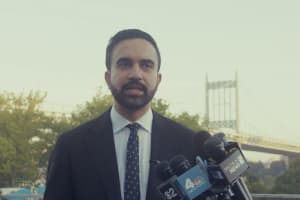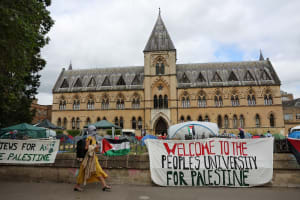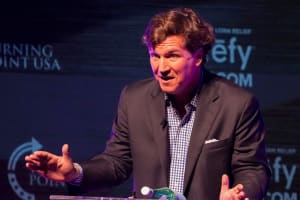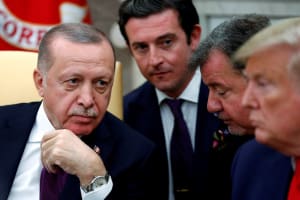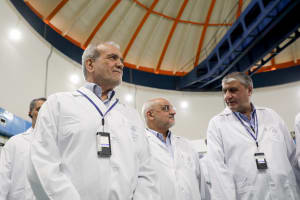NYC Imam Sheikh Musa Drammeh rebukes Mamdani's boycott of Israel with bridge-building mission to Holy Land

The mayoral race in New York City is garnering worldwide curiosity as the first Muslim candidate is currently leading the race. This past summer, during the first primary debate, all nine candidates were asked where their first international trip would be. Nearly all said Israel. However, Democratic candidate for New York mayor, Zohran Mamdani, said he would refuse to travel to the Jewish state.
Sheikh Musa Drammeh, New York City’s imam, was incensed by Mamdani’s reply. As one who has dedicated his life to building bridges between Muslims and Jews – and is outspoken and committed to interfaith unity, most of it in the Bronx area – Drammeh was surprised that Mamdani took such a strong stance on stage against Israel and the Jewish community.
“This guy is the first Muslim candidate on stage with the privilege that never existed before,” Drammeh told The Media Line.
“What he prioritizes becomes the priority [for his followers]. If we allow his refusal to go to the Holy Land, then antisemitism will increase, anti-Israel sentiment will increase, and it will be normalized,” Drammeh said in an interview with author and journalist Maayan Hoffman.
Drammeh began developing a plan to preserve much of the progress already made toward fostering peace between the communities. He told his wife that he intended to form a delegation of Muslim leaders to visit Israel on Mamdani’s behalf, arguing that such a move would render the candidate’s refusal “null and void.” He followed up with an open letter inviting other leaders to join.
After seeing the letter, Jewish NGO Sharaka reached out to Drammeh. Together, they arranged a delegation of eight imams and other Muslim leaders – seven from the United States and one from Germany, many based in New York – who have been visiting Israel since Oct. 25.
The group has visited Jerusalem’s religious and historical landmarks, met with local experts and community leaders, and spoken with Israeli Arabs and interfaith rabbis. They also toured the sites of the Oct. 7 terror attacks to better understand the war’s realities, and joined a seminar at the Yad Vashem Holocaust Museum, where they discussed extremism, modern genocides, and ways to promote coexistence within their communities.
The program was conducted with the assistance of the Conference on Jewish Material Claims Against Germany. “Just as our name, Sharaka, means across regions, faiths and communities, we are privileged to have a powerful global network of courageous voices who stand up for truth and understanding,” said Managing Director Noam Meirov.
Holocaust education program manager for Sharaka, Alyssa Annis, said that all group participants have been actively involved in pursuing peace and building bridges between Muslims and Jews and are committed to fighting extremism and the surge of antisemitism that has deepened in their cities and communities.
Annis noted that some participants were “a bit scared,” not only to acknowledge the bridge-building work they’re doing within their own communities, but also to admit they came to Israel. However, they arrived determined to learn and take those lessons back home. “They walked into that Hall of Names at Yad Vashem at the end, and began crying,” Annis told The Media Line.
She noted that since Oct. 7, 2023, Sharaka and diplomats from across the region have worked to sustain trust between Jews and Arabs in the Abraham Accords nations – the United Arab Emirates, Morocco, and Bahrain – a task she described as “very difficult.” Still, as the war winds down and, with hope, the remaining hostages are returned, she believes “people will feel a bit less afraid to be publicly moderate.”
Another Muslim leader on the trip, Aicha Cisse, said New York feels “so divided.” Many Americans have voiced their opinions on the country feeling “divided” as a whole between the two main political parties – Republicans and Democrats. This divide has often led people with differing opinions to feel that friendship across political lines is impossible. The New York City mayoral race has stirred similar concerns and reflections.
Media Line polling information places Mamdani in the lead with 43%, trailed by Andrew Cuomo at 33% and Curtis Sliwa at 14%. With early voting already underway for the Nov. 4 election, some progressive rabbis have endorsed Mamdani for his socialist policies, however, most Jewish leaders oppose his criticism of Israel and warn that his win could further inflame antisemitism.
“Everyone knows we’re here throughout the Muslim world,” Drammeh said. “We have journalists writing about us throughout New York … Should Mamdani become mayor, his antisemitic and anti-Israeli positions will no longer be as effective because New York has gone to Israel on his behalf even before he’s elected. So, we will be able to expand this and bring more influential leaders, political leaders and religious leaders.”
For New York’s more than one million Jewish residents, this election holds special weight. The possibility of an outspoken candidate like Mamdani taking office has fueled anxiety and renewed worries about security in Jewish neighborhoods.
Cisse said she wanted to see Israel for herself because there is “so much misinformation out there.”
“I came here so that I can learn more about what is happening and what I can do as an individual who is part of this amazing community back in the Bronx,” she said, explaining, “The perception we have about Israelis and Jews in Israel is off. Everybody is so open and so loving and so welcoming.”
According to Cisse, media coverage frequently paints a picture of tension between Jews, Muslims, and Christians in Israel, but what she witnessed on the ground was the opposite. “There’s a Muslim shop right there. There’s a Jewish shop right there. You pass them, and they greet you so nicely. This one says shalom. This one says as-salamu alaykum,” she recalled. “We went over to the Western Wall – same thing … and I think it is authentic.”
Drammeh said that antisemitism among Muslims and Christians stems from very different sources. Many Christians, he explained, believe that Jews killed Jesus or that Christianity replaced Judaism. Muslim antisemitism, by contrast, is rooted in the perception that Jews “stole” or “occupy” Muslim land. Still, Drammeh said, Muslims who hold such views have “zero understanding of Israel or their own religion.” “Anti-Zionism from the Muslim world is based on 100% ignorance,” he added. “It’s not biblical. It’s not in the Quran.”
During his visit to Israel, Drammeh said he has been sharing his experiences in real time with an audience of over 20,000 Muslims worldwide via social media.
He noted: “Israel has a bad rap” due to the spread of falsehoods and misinformation. He also pointed out that roughly 20% of the country’s population is non-Jewish, and that Arab citizens even hold seats in the Israeli parliament.
Drammah pointed out that antisemitism is not solely a Jewish problem, according to The Media Line. “It’s also our problem. It’s our duty as Muslims, because we are now numbering close to 2 billion Muslims and there are only about 15 million Jews,” he said. “We’re going to become brothers and sisters, and we’re going to make sure that no Jew feels isolated or scared or abandoned or lonely or vulnerable. That is the message that this trip is intended to broadcast all over the world.”
Cisse acknowledged that she shares the same goal but admitted that persuading people about things they haven’t witnessed firsthand can be challenging. She believes this is why initiatives like this mission are crucial in helping Muslim leaders gain a true understanding of Israel. “Progress in life comes in baby steps,” she added.
Amit Deri, chairman and co-founder of Sharaka, said he sees his organization as especially well-placed to foster tolerance and dialogue across Muslim communities globally. “In light of the alarming rise in antisemitism, we take pride in being the leading NGO bringing Muslim delegations to Israel,” Deri said.
Annis echoed this view: “It’s no longer a regional issue; it’s also a religious issue, and we believe that Judaism and Islam need to work together to build bridges."

The All Israel News Staff is a team of journalists in Israel.
You might also like to read this:


